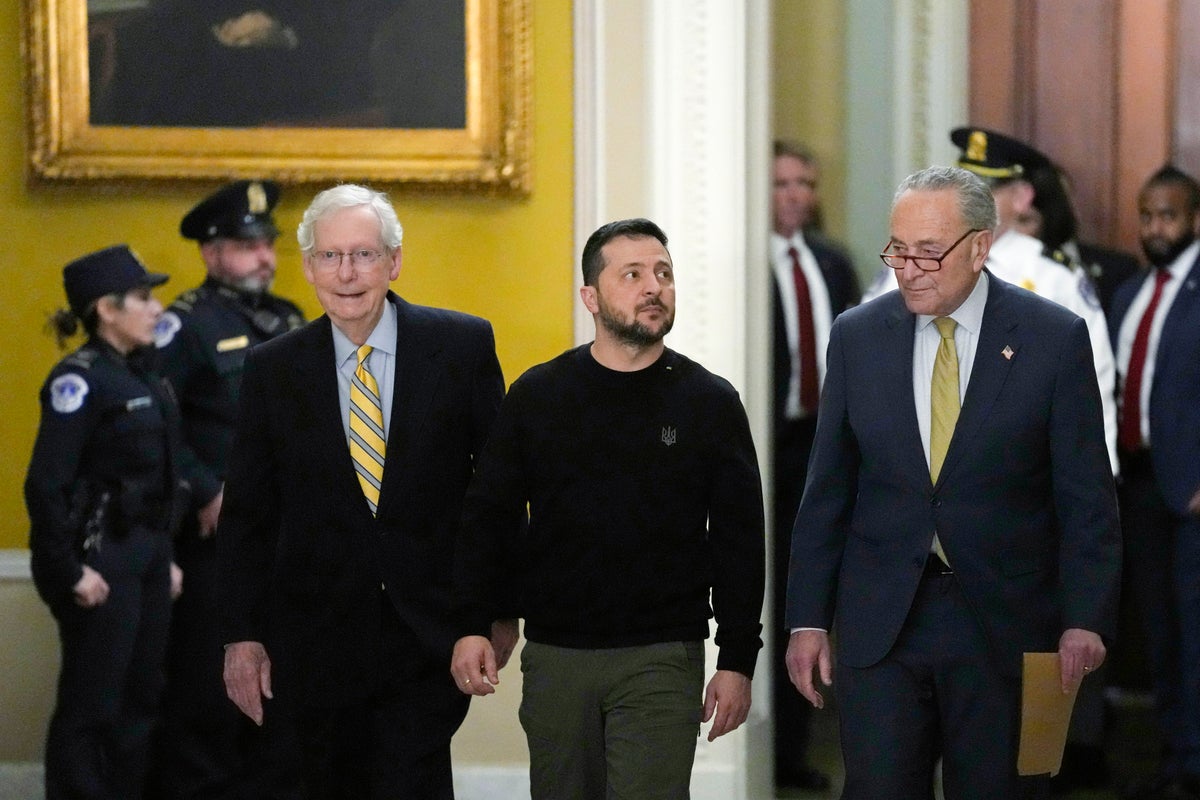
The prospect of military support for Ukraine and Israel making it through the US Senate looks as uncertain as ever as lawmakers returned on Monday for last-minute negotiations.
Despite broad bipartisan support in the upper chamber for legislation to bolster the fighting capabilities of those two countries, the Senate remains deadlocked thanks to Republican demands for immigration and border security to be addressed alongside any foreign military funding packages. Even an emergency visit by Ukrainian President Volodymyr Zelensky last week didn’t convince the GOP to budge.
Members of the president’s party continue to project optimism as the chamber convenes for at least the next few days; Joe Manchin, a centrist who often bucks the Democratic majority, predicted that a deal was within reach.
“I think we’re gonna see something next week,” he said Sunday on CNN’s State of the Union. “[W]e’ll stay there until we get it done.”
He added, “Well, let me just say this: that I have been communicating with the negotiators, my colleagues and friends on the Democrat and Republican side, also with the White House too, and I’m very encouraged.”
And Senate Majority Leader Chuck Schumer claimed that progress was being made as he called members back to work this week on Thursday: “Over the last few days, negotiations on a path forward to getting national security supplemental done have made good progress.”
The Democratic leader has promised a vote this week. But members of both parties are publicly doubting that timeline.
Republicans seemed extremely doubtful about getting legislation across the finish line, as some on the left questioned the sincerity of their efforts. Senator Lindsey Graham told NBC’s Meet the Press on Sunday that he expected negotiations to be pushed into January.
"We feel like we’re being jammed. We’re not anywhere close to a deal. It’ll go into next year," the South Carolina Republican predicted.
E&E News reported Monday that Senate Minority Leader Mitch McConnell had agreed, and described the two sides as far apart in a letter to his caucus. It was co-signed by James Lankford, the GOP’s lead negotiator. Mr Lankford and Mr McConnell’s #2 John Thune later told reporters Monday afternoon that lawmakers did not expect to even receive legislative text or the framework of an agreement by the end of this week.
The House remains in recess for the holidays. Speaker Mike Johnson could, theoretically, call back lawmakers to Washington for a vote but risks the prospect of another rebellion from the far right; that prospect may be unavoidable given that any legislation which would win bipartisan support in the Senate would likely be unpalatable for the GOP’s hardliners who are calling for more drastic action at the border and in many cases oppose any further funding for Ukraine.
Last Thursday, he threw the idea of calling back his members into doubt and claimed that any legislation produced by the Senate this week to fund border security or foreign military aid would be a “rushed product”.
President Joe Biden also faces his own minefield as talks around the issue of immigration reform continue. Beset by brutal poll numbers and crumbling support for his handling of Israel’s military assault against the Gaza Strip and Hamas, Mr Biden is also seeing resistance from Latinos in his party towards concessions to the GOP on issues like tightening asylum eligibility and changes to humanitarian parole.
Complicating that issue for the president: No Latino Democrats are directly involved in the negotiations with Republicans on the issue. That exclusion has drawn rebukes from senators including Bob Menendez of New Jersey, Alex Padilla of California and Ben Ray Luján of New Mexico. Mr Menendez specifically told reporters last week that he had no faith in Senator Chris Murphy as the lead Democratic negotiator.
“A return to Trump-era policies is not the fix,” Mr Padilla told The Associated Press. “In fact, it will make the problem worse.”
Reports detailing the president’s thinking of late have described Mr Biden as increasingly worried about his standing in the polls against Donald Trump, the four-times-indicted ex-president currently facing 92 felony counts and clearly leading the race for the Republican nomination.
Those concerns could lead him to listen to members of his base on the issue, but realistically are more likely to spur him to encourage common ground to be struck with Republicans so that his campaign can tout the passage of another significant piece of legislation this coming year.
Biden White House officials denied to Politico last week that the president was putting his thumb on the scale in support of any particular policy.
“The White House has not signed off on any particular policy proposals or final agreements, and reporting that ascribes determined policy positions to the White House is inaccurate,” said a spokesperson.







